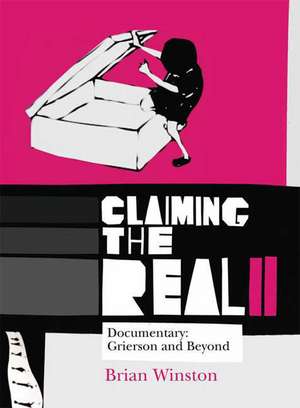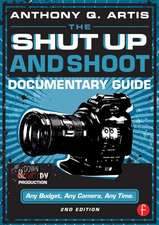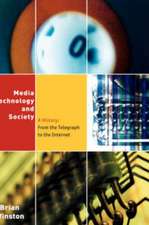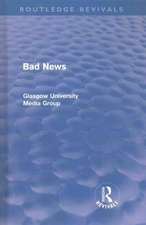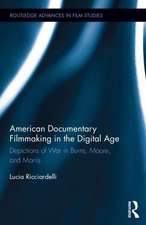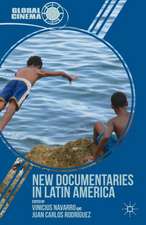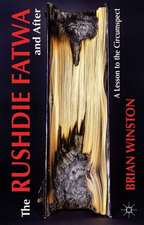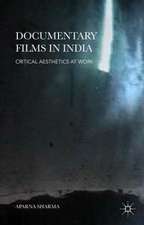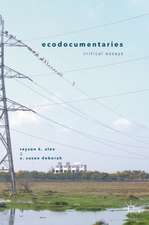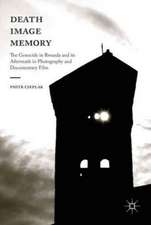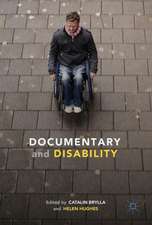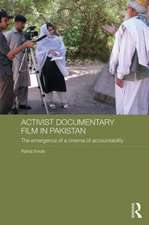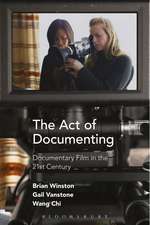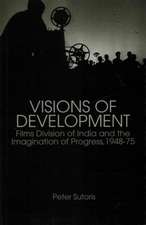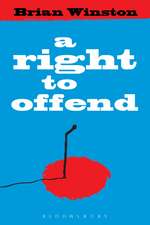Claiming the Real: Documentary: Grierson and Beyond
Autor Brian Winstonen Limba Engleză Paperback – 20 noi 2008
Preț: 235.29 lei
Nou
Puncte Express: 353
Preț estimativ în valută:
45.03€ • 46.84$ • 37.17£
45.03€ • 46.84$ • 37.17£
Carte tipărită la comandă
Livrare economică 14-28 aprilie
Preluare comenzi: 021 569.72.76
Specificații
ISBN-13: 9781844572717
ISBN-10: 1844572714
Pagini: 336
Ilustrații: 44 black & white halftones
Dimensiuni: 155 x 235 x 23 mm
Greutate: 0.57 kg
Ediția:Revizuită
Editura: British Film Institute
Colecția British Film Institute
Locul publicării:London, United Kingdom
ISBN-10: 1844572714
Pagini: 336
Ilustrații: 44 black & white halftones
Dimensiuni: 155 x 235 x 23 mm
Greutate: 0.57 kg
Ediția:Revizuită
Editura: British Film Institute
Colecția British Film Institute
Locul publicării:London, United Kingdom
Descriere
Claiming
the
Real II describes
the
origins, development
and
current
state of
documentary
cinema,
and
the
social,
political,
industrial
and
ethical
factors that
determine
its
production.
This
new
edition
addresses
the
ethical
quagmires,
digital
technologies
and
proliferating
forms
that
have
transformed
documentary
cinema.
Cuprins
Preface
I.-
Preface
to
the
2nd
edition.-
PART
I:
THE
CREATIVE
TREATMENT
OF
ACTUALITY.-The
Documentary
and
CGI.-
The
Documentary
Film
in
1914.-
The
Documentary
as
the
Creative
Treatment
of
Actuality.-
PART
II:
CREATIVE:
DOCUMENTARY
AS
ART.-
Photography
as
Art.-
The
Documentarist
as
Explorer/Artist.-
The
Griersonian
Artist.-
Documentary
Film
and
Realist
Painting.-
The
Politics
of
Realism.-
Running
Away
from
Social
Meaning.-
Poor,
Suffering
Characters:
Victims
and
Problem
Moments.-
Serious-Minded
Chaps:
Politics
and
Poetics.-
He
Never
Used
the
Word
Revolution.-
To
Command,
and
Cumulatively
Command,
the
Mind
of
a
Generation.-
Running
Away
from
Social
Meaning
in
America.-
Staatspolitisch
Besonders
Wertvoll.-
To
Win
New
Comrades
for
the
Cause.-
A
Curious
Comment.-
PART
III:
TREATMENT:
DOCUMENTARY
AS
DRAMA.-
Life
as
Narrativised.-
Chrono-Logic.-
Non-Narrative:
Works
Better
in
the
Head
than
on
the
Screen.-
Sincere
and
Justifiable
Reconstruction.-
PART
IV:
ACTUALITY:
DOCUMENTARY
AS
SCIENCE.-
Photography
as
Science.-
Science
as
Inscription.-
Evidence
in
the
Law.-
Technologising
the
Documentary
Agenda.-
Documentary
as
Scientific
Inscription:
Film
as
Evidence.-
Moments
of
Revelation.-
This
Objective–Subjective
Stuff
Is
a
Lot
of
Bullshit.-
Kinopravda.-
Film
as
Ethnography.-
Film
as
Truth.-
The
Principles
of
Visual
Anthropology.-
Flies
in
the
Soup:
The
Influence
of
Cinéma
Vérité.-
Flies
on
the
Wall:
The
Influence
of
Direct
Cinema.-
PART
V:
THE
POST-GRIERSONIAN
DOCUMENTARY?.-
The
Naturalistic
Illusion.-
The
Battlefields
of
Epistomology.-
The
Difference
that
Makes
a
Difference.-
What
Constraints?.-
The
Voluntary
Consent
of
the
Human
Subject.-
What
Interests
the
Public.-
The
Nadir
of
Human
Achievement.-
The
post-Griersonian
Documentary:
a
tour
d'horizon.-
The
post-Griersonian
Documentary:
The
Farther
Shore.-
Do
Not
Be
Afraid…..-
Envoi.-
Notes.-
Bibliography.-
Index.
Notă biografică
BRIAN
WINSTON
is
the
Lincoln
Professor
of
Communications
at
the
University
of
Lincoln,
and
has
been
involved
with
documentary
since
1963.
He
has
an
Emmy
for
documentary
scriptwriting;
has
taught
documentary
in
both
the
US
and
the
UK;
and
has
long
been
involved
with
many
international
documentary
film
festivals
and
the
Visible
Evidence
conference
series.
Winston
first
wrote
about
documentary
in
1978.
He
is
the
author
of
a
number
of
books,
includingMedia,
Technology
and
Society:
A
History,
from
the
Telegraph
to
the
Internet(1998),
a
volume
on"Fires
Were
Started–"(1999)
in
the
BFI
Film
Classics
series,Lies,
Damn
Lies
and
Documentaries(2000)
andMessages:
Free
Expression,
Media
and
the
West,
from
Gutenberg
to
Google(2005).
Textul de pe ultima copertă
CLAIMING THE REAL II tells the story of the emergence, development and current state of documentary film emerged and addresses the social, political, industrial and ethical factors that have determined documentary production, esepcially in the English-speaking world.
John Grierson's definition of the documentary as 'the creative treatment of actuality' appears increasingly inadequate in the face of theoretical sophistication, ethical quagmires and digital's undermining of the photographic image's intrinsic claim on the real. Documentary forms are proliferating. No longer does the 'fly-on-wall' direct cinema style – creative treatment's purest form – sum up the documentary. Diverse forms such as agitprop and advocacy, animated documentary and CGI, satire, poetry and pictorialism, docusoaps, dramadocs and documusicals, excluded feminist, minority and other marginalised voices and first person documentaries, mockumentaries and rockumentaries, never mind 'reality' television – all assert their documentary status.
Brian Winston's illuminating history of the documentary is interwoven with considerations of ethical and theoretical concerns. This revised and updated edition includes a restructured last section on 'The Post-Griersonian Documentary'; addresses the issues raised by the richness of recent work, and offers a new definition of documentary that responds to its current abundance.
Caracteristici
Update
of
key
text
on
the
history
of
documentary
cinema
Winston considers ethics and issues in documentary filmmaking as well as outlining its historical development.
Winston considers ethics and issues in documentary filmmaking as well as outlining its historical development.
